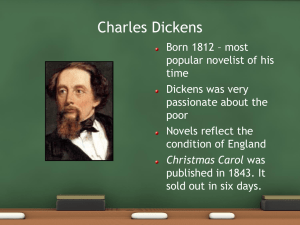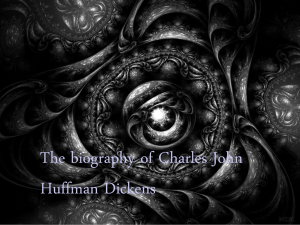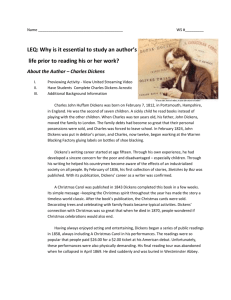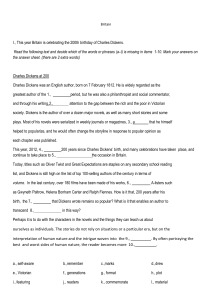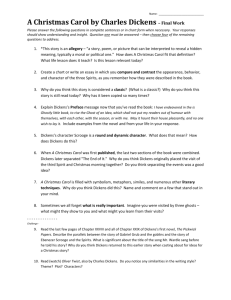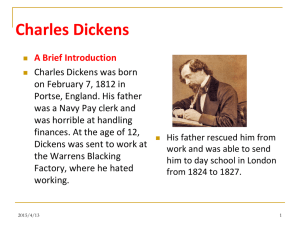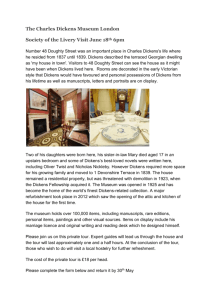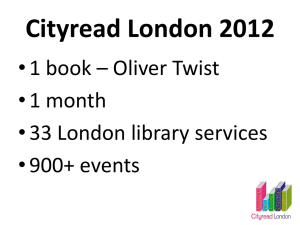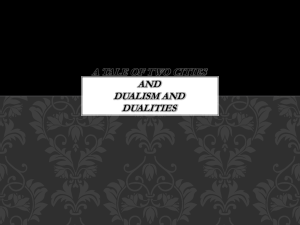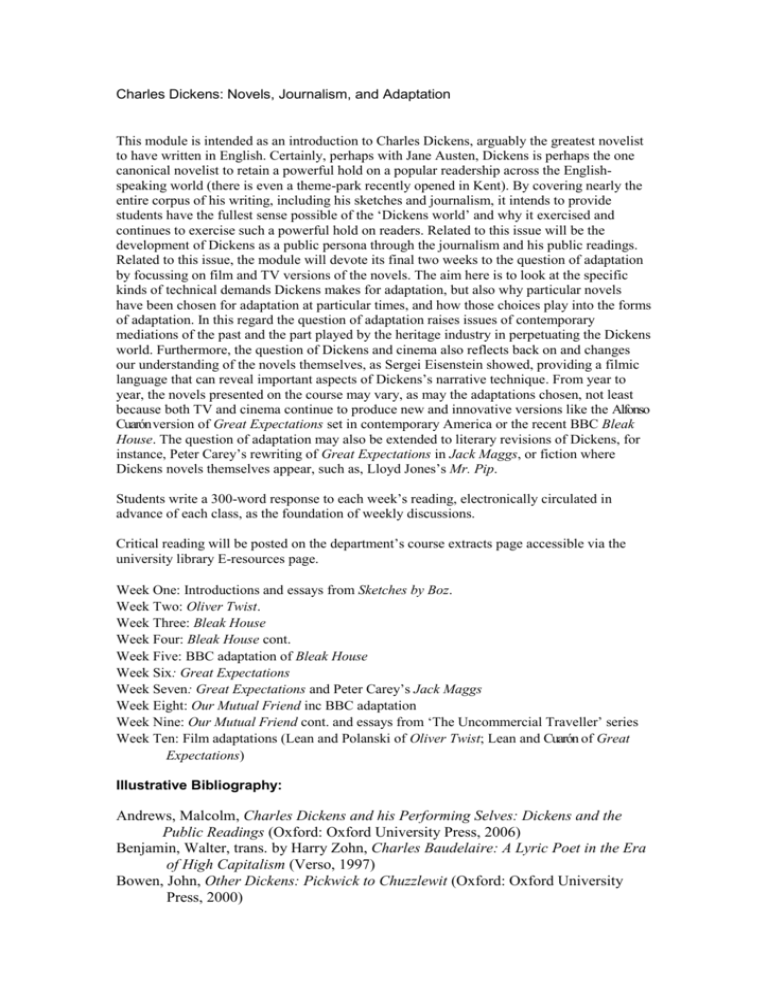
Charles Dickens: Novels, Journalism, and Adaptation
This module is intended as an introduction to Charles Dickens, arguably the greatest novelist
to have written in English. Certainly, perhaps with Jane Austen, Dickens is perhaps the one
canonical novelist to retain a powerful hold on a popular readership across the Englishspeaking world (there is even a theme-park recently opened in Kent). By covering nearly the
entire corpus of his writing, including his sketches and journalism, it intends to provide
students have the fullest sense possible of the ‘Dickens world’ and why it exercised and
continues to exercise such a powerful hold on readers. Related to this issue will be the
development of Dickens as a public persona through the journalism and his public readings.
Related to this issue, the module will devote its final two weeks to the question of adaptation
by focussing on film and TV versions of the novels. The aim here is to look at the specific
kinds of technical demands Dickens makes for adaptation, but also why particular novels
have been chosen for adaptation at particular times, and how those choices play into the forms
of adaptation. In this regard the question of adaptation raises issues of contemporary
mediations of the past and the part played by the heritage industry in perpetuating the Dickens
world. Furthermore, the question of Dickens and cinema also reflects back on and changes
our understanding of the novels themselves, as Sergei Eisenstein showed, providing a filmic
language that can reveal important aspects of Dickens’s narrative technique. From year to
year, the novels presented on the course may vary, as may the adaptations chosen, not least
because both TV and cinema continue to produce new and innovative versions like the Alfonso
Cuarón version of Great Expectations set in contemporary America or the recent BBC Bleak
House. The question of adaptation may also be extended to literary revisions of Dickens, for
instance, Peter Carey’s rewriting of Great Expectations in Jack Maggs, or fiction where
Dickens novels themselves appear, such as, Lloyd Jones’s Mr. Pip.
Students write a 300-word response to each week’s reading, electronically circulated in
advance of each class, as the foundation of weekly discussions.
Critical reading will be posted on the department’s course extracts page accessible via the
university library E-resources page.
Week One: Introductions and essays from Sketches by Boz.
Week Two: Oliver Twist.
Week Three: Bleak House
Week Four: Bleak House cont.
Week Five: BBC adaptation of Bleak House
Week Six: Great Expectations
Week Seven: Great Expectations and Peter Carey’s Jack Maggs
Week Eight: Our Mutual Friend inc BBC adaptation
Week Nine: Our Mutual Friend cont. and essays from ‘The Uncommercial Traveller’ series
Week Ten: Film adaptations (Lean and Polanski of Oliver Twist; Lean and Cuarón of Great
Expectations)
Illustrative Bibliography:
Andrews, Malcolm, Charles Dickens and his Performing Selves: Dickens and the
Public Readings (Oxford: Oxford University Press, 2006)
Benjamin, Walter, trans. by Harry Zohn, Charles Baudelaire: A Lyric Poet in the Era
of High Capitalism (Verso, 1997)
Bowen, John, Other Dickens: Pickwick to Chuzzlewit (Oxford: Oxford University
Press, 2000)
Carey, John, The Violent Effigy: A Study of Dickens’ Imagination, 2nd edn, (London
and Boston: Faber and Faber, 1991)
Collins, Philip, Dickens and Crime, 3rd edn (Basingstoke: Macmillan, 1994)
Eisenstein, Sergei, ‘Dickens, Griffith, and the Film Today’, Film Form, ed. and trans.
Jay Leyda (New York: Harcourt Brace, 1949; repr. 1977), pp. 195-255.
Glavin, John, After Dickens: Reading, Adaptation and Performance (Cambridge:
Cambridge University Press, 1999)
––– ed., Dickens on Screen (Cambridge: Cambridge University Press, 2003)
Haywood, Ian, The Revolution in Popular Literature: Print, Politics and The People,
1790-1860 (Cambridge: Cambridge University Press, 2004)
Michael Hollington, Dickens and the Grotesque (Beckenham: Croom Helm, 1984)
John, Juliet, Dickens’s Villains: Melodrama, Character, Popular Culture (Oxford:
Oxford University Press, 2001)
Jordan, John O., and Robert Patten, eds, Literature in the Marketplace (Cambridge:
Cambridge University Press,1995)
Leavis, F. R., The Great Tradition (Chatto & Windus, 1948).
––– and Q. D. Leavis, Dickens the Novelist (Chatto & Windus, 1970)
Ledger, Sally, Dickens and the Popular Radical Imagination (Cambridge: Cambridge
University Press, 2007)
Mee, Jon, The Cambridge Introduction to Charles Dickens (Cambridge: Cambridge
University Press, 2010)
Miller, D.A., The Novel and the Police (Berkeley, CA and London: University of
California Press, 1988)
Miller, J. Hillis, Victorian Subjects (Hemel Hempstead: Harvester Wheatsheaf, 1990)
Rose, Jonathan, The Intellectual life of the British Working Classes (New Haven,
Conn.: Yale University Press, 2002)
Schlicke, Paul, Dickens and Popular Entertainment (Allen and Unwin,1985)
Schor, Hilary, Dickens and The Daughter of the House (Cambridge: Cambridge
University Press, 1999)
Slater, Michael, Charles Dickens (New Haven and London: Yale University Press,
2009).
Smith, Grahame, Dickens and the Dream of Cinema (Manchester and New York:
Manchester University Press, 2003)
Tambling, Jeremy, Going Astray: Dickens and London (Harlow: Pearson Longman,
2009)
Waters, Catherine, Dickens and the Politics of the Family (Cambridge: Cambridge
University Press, 1997)

